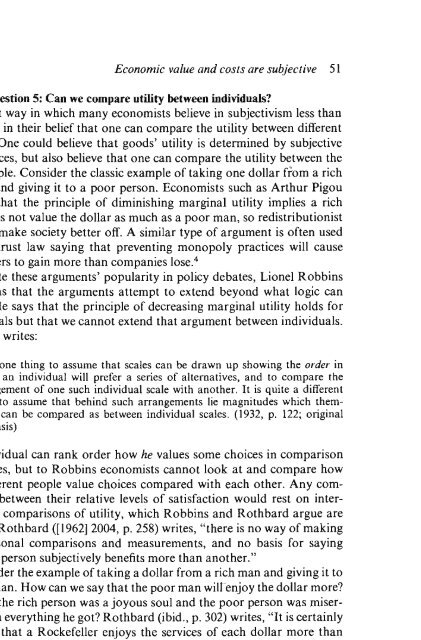Handbook on Contemporary Austrian Economics
Handbook on Contemporary Austrian Economics
Handbook on Contemporary Austrian Economics
You also want an ePaper? Increase the reach of your titles
YUMPU automatically turns print PDFs into web optimized ePapers that Google loves.
Ec<strong>on</strong>omic value and costs are subjective 51<br />
4.6 Questi<strong>on</strong> 5: Can we compare utility between individuals<br />
The next way in which many ec<strong>on</strong>omists believe in subjectivism less than<br />
others is in their belief that <strong>on</strong>e can compare the utility between different<br />
people. One could believe that goods' utility is determined by subjective<br />
preferences, but also believe that <strong>on</strong>e can compare the utility between the<br />
two people. C<strong>on</strong>sider the classic example of taking <strong>on</strong>e dollar from a rich<br />
pers<strong>on</strong> and giving it to a poor pers<strong>on</strong>. Ec<strong>on</strong>omists such as Arthur Pigou<br />
argued that the principle of diminishing marginal utility implies a rich<br />
man does not value the dollar as much as a poor man, so redistributi<strong>on</strong>ist<br />
policies make society better off. A similar type of argument is often used<br />
for antitrust law saying that preventing m<strong>on</strong>opoly practices will cause<br />
c<strong>on</strong>sumers to gain more than companies lose. 4<br />
Despite these arguments' popularity in policy debates, Li<strong>on</strong>el Robbins<br />
maintains that the arguments attempt to extend bey<strong>on</strong>d what logic can<br />
prove. He says that the principle of decreasing marginal utility holds for<br />
individuals but that we cannot extend that argument between individuals.<br />
Robbins writes:<br />
[Ilt is <strong>on</strong>e thing to assume that scales can be drawn up showing the order in<br />
which an individual will prefer a series of alternatives, and to compare the<br />
arrangement of <strong>on</strong>e such individual scale with another. It is quite a different<br />
thing to assume that behind such arrangements lie magnitudes which themselves<br />
can be compared as between individual scales. (1932, p. 122; original<br />
emphasis)<br />
An individual can rank order how he values some choices in comparis<strong>on</strong><br />
to choices, but to Robbins ec<strong>on</strong>omists cannot look at and compare how<br />
two different people value choices compared with each other. Any comparis<strong>on</strong><br />
between their relative levels of satisfacti<strong>on</strong> would rest <strong>on</strong> interpers<strong>on</strong>al<br />
comparis<strong>on</strong>s of utility, which Robbins and Rothbard argue are<br />
invalid. Rothbard ([1962] 2004, p. 258) writes, "there is no way of making<br />
interpers<strong>on</strong>al comparis<strong>on</strong>s and measurements, and no basis for saying<br />
that <strong>on</strong>e pers<strong>on</strong> subjectively benefits more than another."<br />
C<strong>on</strong>sider the example of taking a dollar from a rich man and giving it to<br />
a poor man. How can we say that the poor man will-enjoy the dollar more<br />
What if the rich pers<strong>on</strong> was a joyous soul and the poor pers<strong>on</strong> was miserable<br />
with everything he got Rothbard (ibid., p. 302) writes, "It is certainly<br />
possible that a Rockefeller enjoys the services of each dollar more than<br />
a poor, but highly ascetic, individual does." The fact is we cannot make<br />
a judgment either way, because there is no way to compare the relative<br />
satisfacti<strong>on</strong>s between different people.<br />
Robbins brings up an interesting questi<strong>on</strong> about the possibility of measuring<br />
people's utilities by examining their bloodstreams. But to Robbins

















